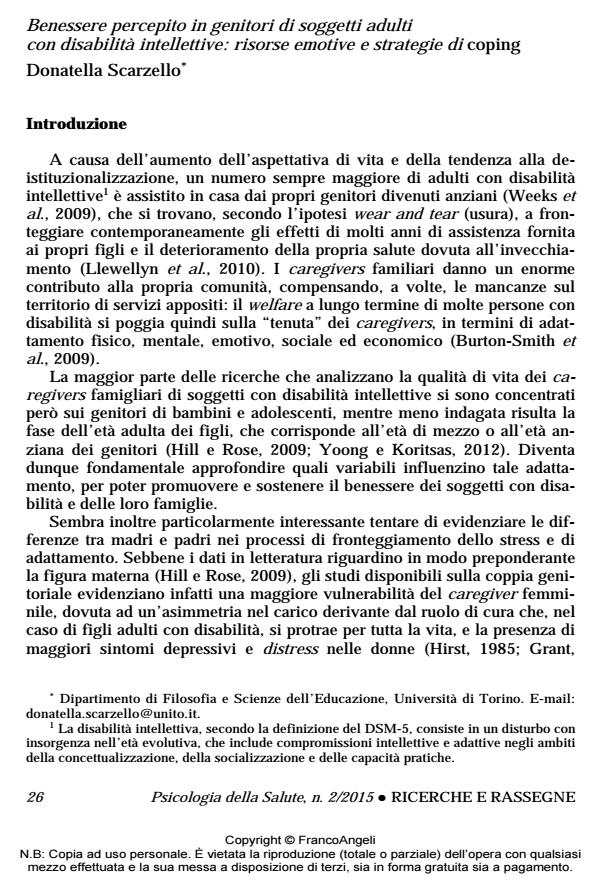Benessere percepito in genitori di soggetti adulti con disabilità intellettive: risorse emotive e strategie di coping
Titolo Rivista PSICOLOGIA DELLA SALUTE
Autori/Curatori Donatella Scarzello
Anno di pubblicazione 2015 Fascicolo 2015/2
Lingua Italiano Numero pagine 21 P. 26-46 Dimensione file 101 KB
DOI 10.3280/PDS2015-002003
Il DOI è il codice a barre della proprietà intellettuale: per saperne di più
clicca qui
Qui sotto puoi vedere in anteprima la prima pagina di questo articolo.
Se questo articolo ti interessa, lo puoi acquistare (e scaricare in formato pdf) seguendo le facili indicazioni per acquistare il download credit. Acquista Download Credits per scaricare questo Articolo in formato PDF

FrancoAngeli è membro della Publishers International Linking Association, Inc (PILA), associazione indipendente e non profit per facilitare (attraverso i servizi tecnologici implementati da CrossRef.org) l’accesso degli studiosi ai contenuti digitali nelle pubblicazioni professionali e scientifiche.
Un numero sempre crescente di adulti con disabilità intellettiva è assistito a casa dai genitori anziani, ma i dati sulla qualità di vita dei caregivers che si prendono cura di figli adulti sono ancora scarsi. L’obiettivo di questo studio è di identificare alcuni fattori di rischio e di protezione che influenzano la qualità di vita di tale tipologia di caregiver e di evidenziare le differenze tra madri e padri nei processi di fronteggiamento dello stress e di adattamento, analizzando benessere percepito, autoefficacia emotiva, sostegno sociale e strategie di coping nonché le relazioni reciproche tra queste variabili. La ricerca ha esaminato 32 coppie di coniugi, con un’età media di 67 anni, genitori di adulti con disabilità intellettive; ai soggetti sono stati somministrati i seguenti questionari self report: Satisfaction with Life Scale; Coping Inventory for Stressful Situation; Multidimensional Scale of Perceived Social Support; Scala di Autoefficacia Percepita nella Gestione delle emozioni Negative; Scala di Autoefficacia nell’Espressione delle Emozioni Positive. I dati indicano che i padri riportano un livello di benessere maggiore rispetto alle madri; per entrambi i coniugi il livello di benessere è associato positivamente al sostegno sociale e negativamente all’età e al coping focalizzato sull’emozione e, esclusivamente per i padri, anche al coping orientato all’evitamento. Le convinzioni di autoefficacia sembrano giocare ruoli parzialmente differenti nella coppia.
Parole chiave:Benessere dei caregivers, sostegno sociale, autoefficacia, strategie di coping
Donatella Scarzello, Benessere percepito in genitori di soggetti adulti con disabilità intellettive: risorse emotive e strategie di coping in "PSICOLOGIA DELLA SALUTE" 2/2015, pp 26-46, DOI: 10.3280/PDS2015-002003